
This too shall pass.
As one of the most popular self-help books ‘Tough Times Never Last, But Tough People Do,’ by Robert Schuller highlights that life is full of ups and downs, learn to deal with it. This is more relatable to the present day Covid-19 times than ever in the past few decades.
While earlier too people have suffered from severe anxiety, lifestyle disorders, depression, insomnia, work-related stress, and loneliness, which leads to self-doubt and self-harm, the pandemic and the lockdown have only brought these issues to the surface. Plus, with work from home, social distancing and self-isolation at its peak, the need for mental help is more evident than ever. And as seen in our past coverage on the topic, tech startups are looking to address these issues through intervention.
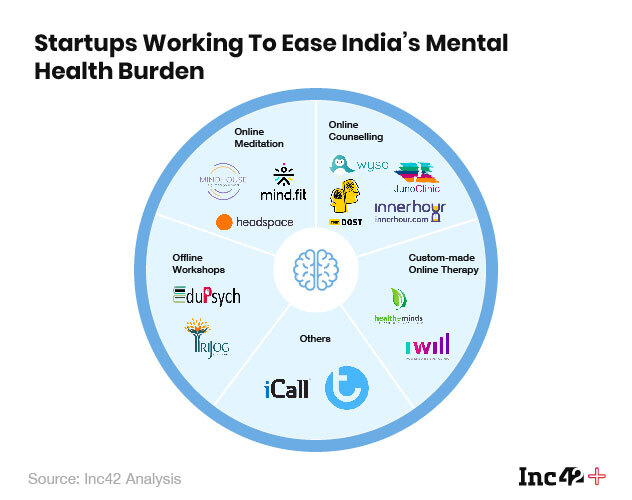
Mental health and wellness startups are not only capitalising on the opportunity by intervening when people most need their help, but also have found revenue and user growth to establish themselves as a presence in the market. Many industry experts also believe that the demand for such service is only going to increase given the uncertainty caused due to Covid-19, and the rise in anxiety related disorder, depression, work-related stress, is only going to increase, and the need for professional service becomes critical.
For instance, Bengaluru-based mental health platform Wysa which works to address the problem with a free artificial intelligence (AI) solution or chatbot app, claimed to have witnessed a 94% increase in new users during the lockdown from February to June 2020, as compared to the same period in 2019. The company believes that the freemium model, in a way, maximises its reach with minimal barriers limiting the acquisition of new users.
Further, it highlighted that the proposition of users who referred to Covid-19 during therapist sessions increased week-on-week during March 2020, from 5% in the first week to 60% in the fourth week. Surprisingly, a large majority of the users reached out to them mentioning their loss of access to care and human support; as well as higher anxiety levels in healthcare staff/professionals as compared to the rest of their populations, unsafe domestic settings, sleep disturbances etc.
Wysa believes that its business model is closely linked to its core mission of providing access to mental health support to the under-served, where the company looks to deliver its services in a ‘pyramid’ of care services, using a freemium model.
The way it works is, at the base of this pyramid, Wysa as an AI chatbot offers basic skill-building and resources for free, to people who are not able to afford to pay for services. “More than 95% of our users use this free service,” Ramakant Vempati, cofounder at Wysa-Touchkin, told Inc42, emphasising on the surge in demand.
Coming to the second layer, is a toolbox of evidence-based self-help techniques available on-demand, for a small fee (INR 300/month). For users who need more advanced support, the Wysa Coach service offers access to trained psychologists. Here, Wysa coaches offer text messaging-based support through five to eight sessions per month, plus unlimited journaling support where users can leave a message for their coach and get a response at a different time, at about INR 3500/month (which is as low as INR 400 per session).
Less Is More
It has to be noted that this blended support model of combining AI chat with human psychologists is unique globally. It allows for mass customisation, where even basic services are tailored to individuals based on their preferences and offered at all hours, yet it can be built using robust clinical input to allow for delivery of a high standard, uniform level of care.
Wysa said that its business model is very amenable to scale, especially for public health systems, and at significantly lower costs of delivery versus traditional alternatives. For example, the company claimed that it can currently support 2 Mn users across the entire pyramid of care services, with only a 40 people team.
In terms of acquiring new users, Vempati told Inc42 that its go-to-market approach uses two channels. The first is direct-to-customer, where users currently discover Wysa through organic means, either on the app stores linked to their search behaviour, reading about it in the media, or through referrals. The other one is through institutional partnerships like the NHS and other public health systems, or employers, where the company is recommended to defined communities, particularly high-risk cohorts, people in stressful work or those on a waitlist looking for support.
“Right now, our approach is global and we implement evidence-based techniques that have cross-cultural validity, which has been tested in multiple geographies, so that they can serve a larger audience. As we are growing further, we’re also building in more capacity for languages so that we can crack that barrier of access too,” Vempati added, talking about its positioning in the market, compared to other players that are predominantly dominated by subscription models.
Backed by pi Ventures, Kae Capital and angel investors, alongside eminent professionals and clinicians like Dr Becky Inkster from the University of Cambridge, Wysa also said that it is witnessing a huge surge of interest from enterprise clients, including healthcare companies, providers, payers and insurers as well as employers.
“Another exciting thing that’s definitely happening for us is the expansion of access in terms of language. We’re looking at building out multi-lingual support, a feature that many of our global users have wanted for some time,” said the cofounder.
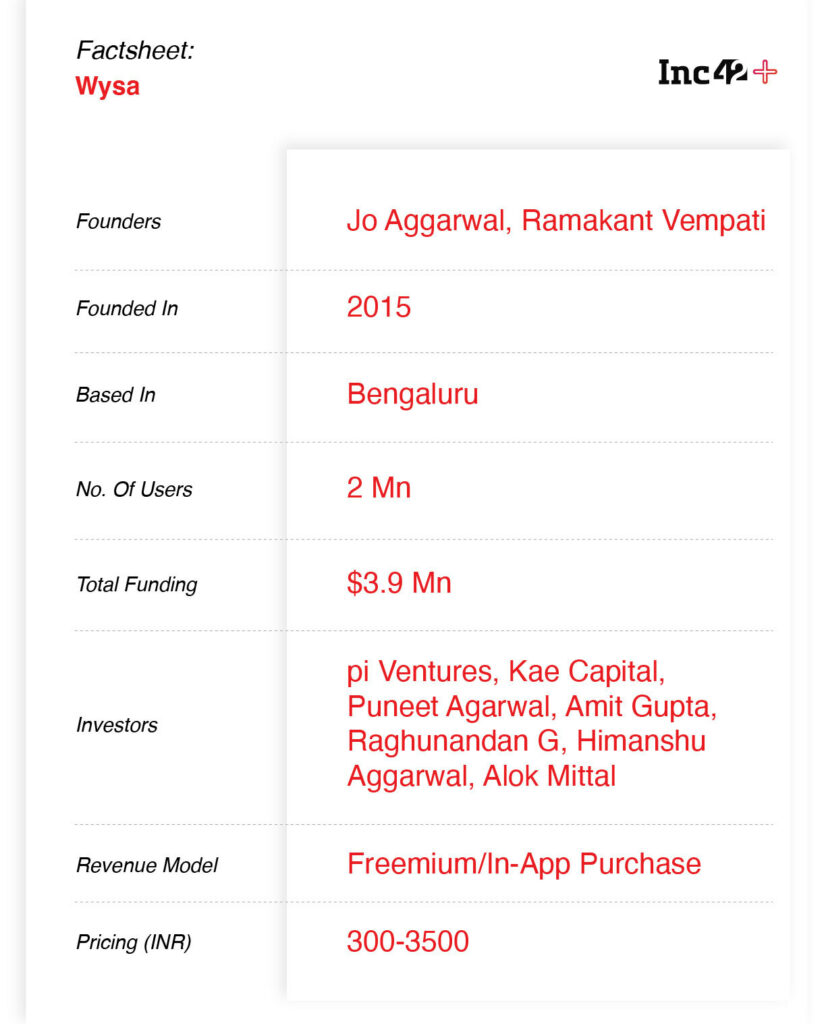
Raising Awareness Across Multiple Mediums
“We need to reach where people are!” asserted Puneet Manuja, the cofounder of YourDOST. The company extensively leverages social media channels to conduct awareness campaigns, events and content. Additionally, it plans to collaborate with specific corporates, colleges and government bodies to amplify awareness for a wider audience, and scale accordingly.
Based in Bengaluru, YourDost was cofounded by Manuja and Richa Singh in 2014. The platform currently has over 900+ experts consisting of psychologists, career coaches, and life coaches and offers all its users 24/7 access to experts in various modes like chat, audio, video, face to face options. Its pool of experts also offers counselling support in nearly all major Indian languages, including Hindi, English, Kanada, Tamil, Malayalam, Bengali among other 20+ languages.
“Through a lot of these awareness interventions, content and self-help materials which are ‘free’ on our website, people are able to understand more about themselves and their emotional wellbeing,” shared Manuja, where he believes that these efforts work together to fight the stigma of mental health in the country and help people understand that mental health is an inseparable and essential art of their daily lives.
Emphasising on how Covid-19 has brought this into public focus, Manuja said that there has been a significant rise in people’s anxiety levels in the recent past. “In the last four months, we have witnessed over a 100% rise in the number of sessions related to anxiety disorders. Also, our studies show that 57% of Indians have experienced a rise in their anxiety. Not all of them suffer from anxiety disorders, but the rise in anxiety has aggravated existing cases of anxiety disorders and triggered new ones as well.” shared Manuja.
Further, he said that over 55% of people also reported a rise in their stress levels, and stress levels do aggravate existing cases of depressive disorders as well as trigger new cases. Additionally, the lockdown has caused people to spend far more time indoors than usual, thus leading to a fall in exposure to sunlight which can cause or worsen depressive symptoms and even lead to seasonal affective disorder. “Again, in the last four months, we have witnessed a 50% rise in the number of sessions related to depressive disorders alone,” he added.
In addition to this, YourDOST said that the other issues which have seen a significant jump in terms of sessions taken by its clients include conflict with parents, time management, relationship issues and work-life balance.
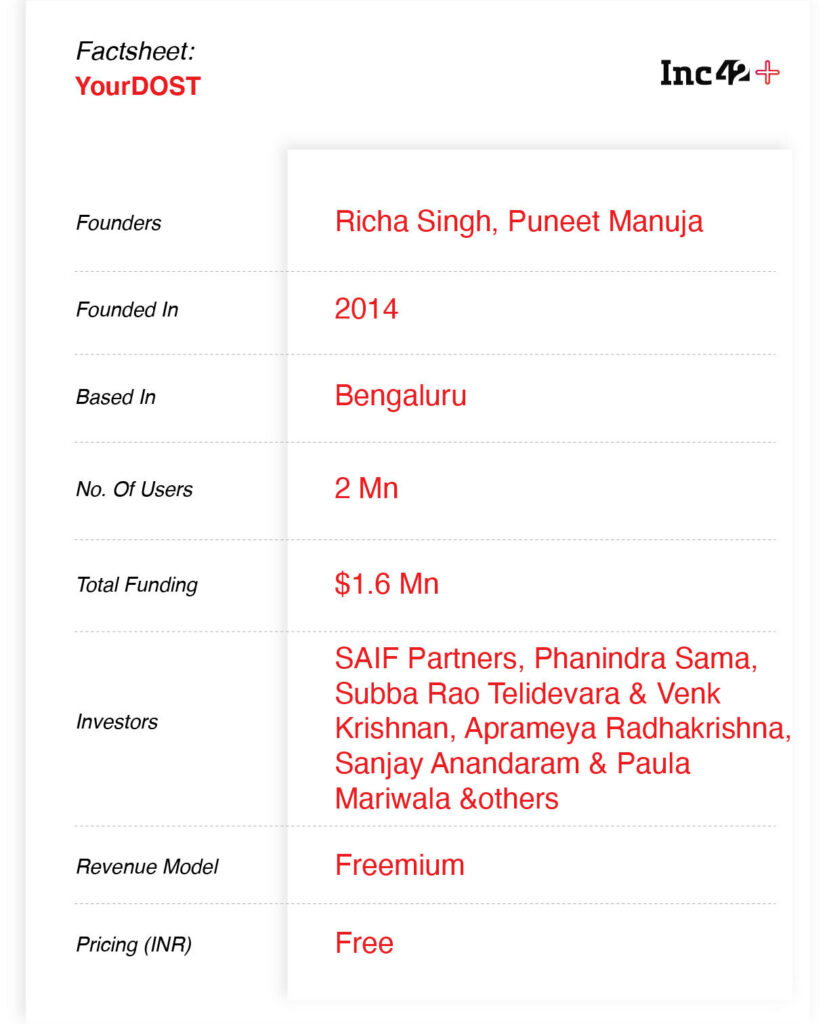
Blending Pathways Towards Holistic Mental Healthcare Solution
Similar to Wysa and YourDOST, Gurugram-based mental wellness startup ePsyClinic also saw an uptick in adoption. Founder Shipra Dawar told Inc42 that it has 100+ psychologists in its core team today and has helped more than 1.2 Lakh patients with direct therapy and counselling sessions in the last three months, and reached more than 3.5 Mn through its content.
Also, its IWill therapy app, where it charges its users on a subscription basis, cost anywhere between INR 3800 to 15K for first time users. Its ePsyClinic, however, is free for users, which is supported by government and funds.
“We are positioned as a clinically strong, high outcome based service through IWill structured therapy. And our inclusive free service at ePsyClinic with funds and government partnerships help us bring mental health to the masses. Therefore, we have provided both exclusivity and inclusivity and that is our positioning,” added Dawar, founder at ePsyClinic.
She added that her experience with dealing with depression helped her realise the vision for the company, which was founded in 2015. ePsyClinic has partnered with the state governments in Haryana, Karnataka, Maharashtra and Rajasthan, and funds (ACT grants) with the agenda to disseminate mental health awareness. At the same time, its IWill therapy has one of the biggest social media communities on Facebook and also many corporate partnerships, through more than 15K blogs, stories, webinars.
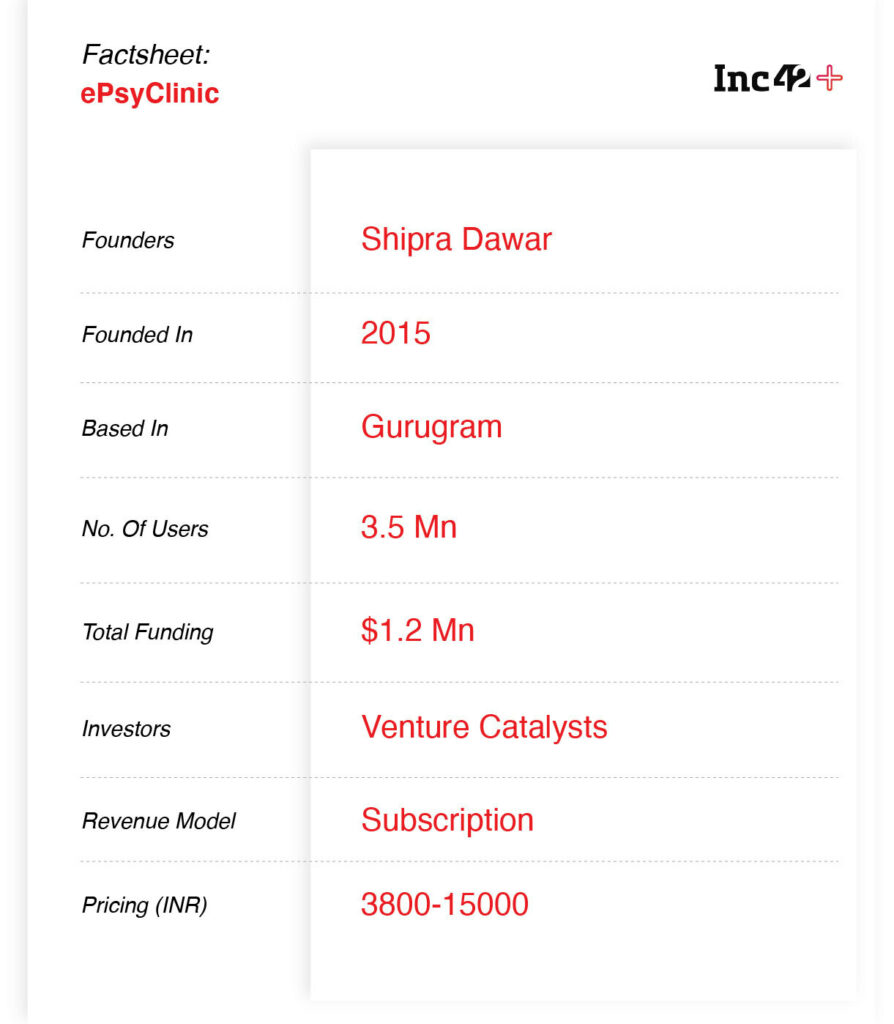
On the other hand, Mumbai-based Trijog, a holistic mental wellness platform that provides access to emotional and mental wellness solutions to individuals, corporates, educational institutes, enterprises, following a hybrid approach, claimed to have steady growth of 20% MoM, however, in the last four months has witnessed a 60% revenue growth, across verticals.
Founded in 2015 by Arushi Sethi and Anureet Sethi, Trijog is backed by GHB Group led by Yugank Sharma.
The company also told Inc42 that during pre-Covid times, it had impacted the lives of around 3500 people through its services, and now looking at the shear magnitude of users availing its services, the company now aims to touch 8K to 10K individual lives by FY21, along with its plans for international expansion.
While pandemic has come as a blessing in disguise for mental health space, it has removed the social stigma and medium from the equation — you don’t have to physically go somewhere to get therapy done, everything can happen with a click of a button, said Arushi Sethi, cofounder at Trijog. She said that previously, the sector was completely unorganised, where there were only a handful of clinics, hospitals and practitioners. Trijog, with its venture looks to knit the gap across segments through online counselling, training institute and webinars among other things.
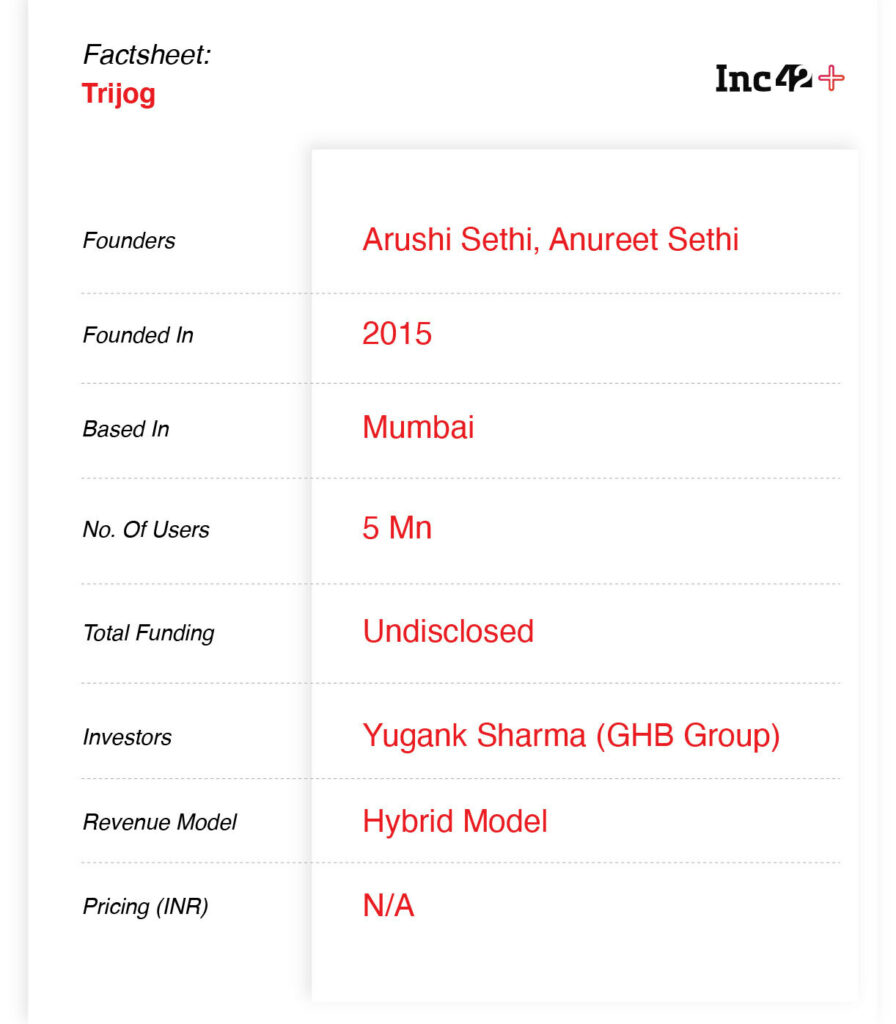
Finding A Niche
While there are numerous players offering solutions in conjunction with broader healthcare programs, there is also a very clear need for a more singular, dedicated approach to mental wellness.
Gurugram-based mental wellness platform Mindhouse, which was founded by Zomato cofounder Pankaj Chaddah and former Zomato chief of staff Pooja Khanna, plans to capture the niche audience by tackling mental health problems through meditation. “We are concentrating on making modern meditation-based mental health solutions accessible to everyone in a convenient and easily consumable format, and hoping that more individuals make a regular habit of practising it,” explained Khanna.
Speaking of Mindhouse’s revenue model, the company offers access to all the live classes and library of meditation based content on its app on a subscription model. It currently has two subscription plans, quarterly plan at INR 399 and annular plan at INR 699. Also, to encourage beginners to make this a part of their routine, Mindhouse has started to offer a one month of free access to all the content in its app for all users. Subsequently, followed by the subscription plans.
“On the B2B side, we are working with multiple corporates to conduct regular live meditation classes, as part of their wellness programmes. We also offer customized wellness solutions for corporates based on their specific needs,” Khanna added.
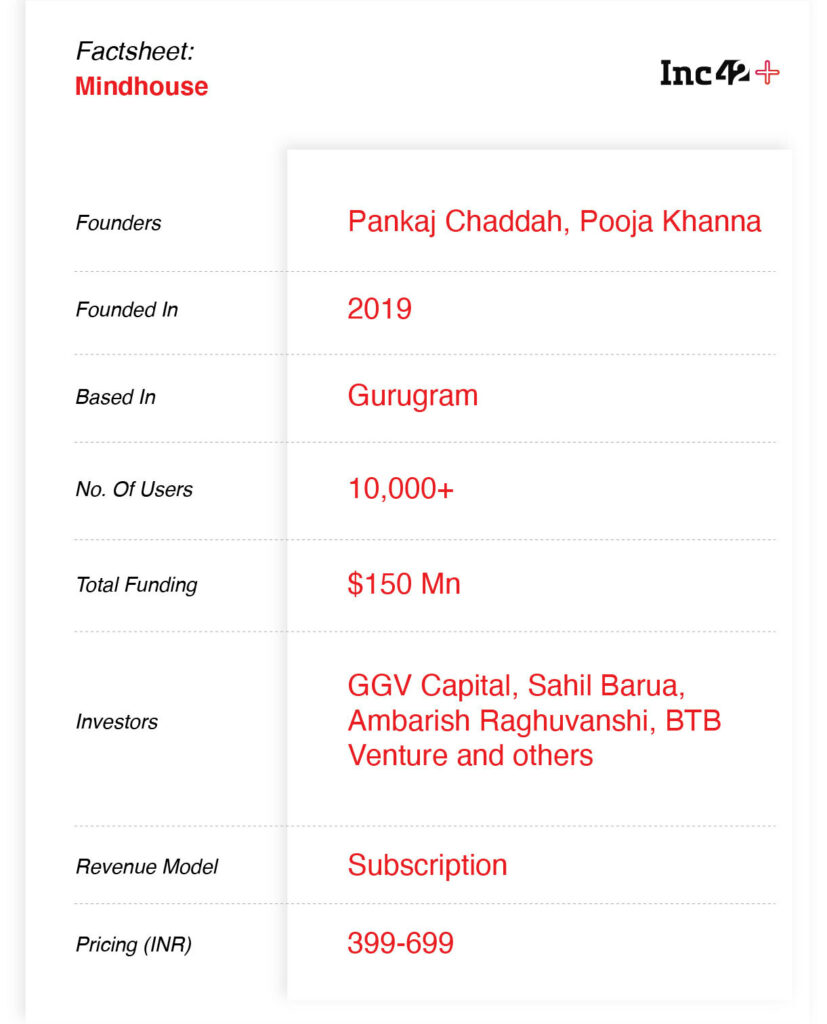
The Question Of Data And Confidentiality
With therapies and counselling getting digitised at a rapid pace, the data generated from users are playing a crucial role for these startups to scale their growth, where various models have emerged keeping in mind the affordability and accessibility aspects for the patients.
At the same time, this information shared with the doctors is vulnerable to data breaches at times, therefore, it becomes paramount for companies to safeguard the data of users, and any misuse of it can have detrimental effects on the patients, where attackers can use it against them.
To tackle this issue, Wysa said that it has incorporated absolutely anonymous, high levels of clinical security and safety, passcode features with no login. This, in a way, makes it easy for someone to keep this a private space so that they can let out thoughts within, especially when they are battling stigma around them.
Giving patients the option to remain anonymous, Wysa aims to bridge the current treatment gap at both the ends of the care cycle (pre-diagnosis as well as continuing care). Its AI conversational agent provides reflective listening with guided self-help techniques in a safe, anonymous space, which can be accessed 24/7 for free. Further, the company said that those who need greater help can get daily therapist support through live chat sessions, still staying anonymous if they choose.
Wysa claimed to help people complete a million cognitive restructuring exercises at a negligible incremental cost. This is an effort equivalent to the output of at least 2K full-time therapists. “Hence, this approach offers hope for scaling early support and creating low friction pathways to expert help so that stigma, lack of access and cost are no longer barriers to support for people who are struggling,” the cofounder added.
YourDOST cofounder Manuja told Inc42 that the doctor-patient confidentiality remains the same across media, be it face-to-face, online counselling, text-based solution or anything else. Traditionally, in order to breach the confidentiality agreement or access the information of the patients, the authority needs to have a court order or legal requirement in the case of any ongoing investigation, particularly life-threatening, self-harm, suicide among others.
In fact, online counselling and digital medium create a safe space for users to be open about their problems, compared to physical clinics where there still exists a stigma around the patients not being comfortable to seek help given the fear of being judged or watched by known people.
Similar to Wysa, YourDOST also claimed that its users can choose to remain anonymous while availing the service, alongside protected by the confidentiality clause. “This way users also feel more comfortable in sharing their feelings and problems, without any hurdles or fear of being judged” said Manuja.
Mental Wellness: Need Of The Hour
For decades, the mental wellness space was associated only with NGOs and ‘not for profits.’ This is slowly changing now as private players, investors are entering into this space, but there’s still a long way to go, as the industry is still in the nascent stages in the country.
Today, if we look at a standard measure for the burden of diseases is disability-adjusted life years (DALYs), which refers to the number of years lost due to ill-health, disability or early death, and India alone stands at 48.6 Cr. In fact, the contribution of mental disorders to the total disease burden in India in terms of DALYs increased from 2.5% in 1990 to 4.7% in 2017. The country is at 2,443 DALYs per 1 Lakh population. In other words, when it comes to mental disorders, India has been going through an epidemic for a while now. According to WHO, India is estimated to suffer economic loss to the tune of $1.03 Tn between 2012 and 2030 due to mental health conditions.
Overall, this illustrates the importance of mental health more than ever, and urges the need for quality mental health care in the country as more and more players enter this space. Most importantly, this is essential for the country’s long term growth, wellbeing and economy, since the wellbeing of people contributes greatly to economic and social productivity.
The post India’s Mental Health Startups On Unlocking The Business Of The Mind In Times Of Crisis appeared first on Inc42 Media.
Author: Amit Raja Naik
Source : https://inc42.com/features/mental-health-startups-on-unlocking-the-business-of-the-mind-in-a-crisis/
Date : 2020-08-05T16:58:39.000Z
